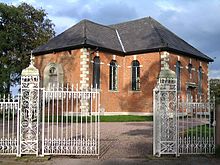St Nicholas' Chapel, Cholmondeley
| St Nicholas' Chapel, Cholmondeley | |
|---|---|

St Nicholas' Chapel, Cholmondeley
|
|
| Coordinates: 53°03′36″N 2°40′51″W / 53.0601°N 2.6808°W | |
| OS grid reference | SJ 536 514 |
| Location | Cholmondeley Castle, Cheshire |
| Country | England |
| Denomination | Anglican |
| History | |
| Founder(s) | Marquess of Cholmondeley |
| Dedication | Saint Nicholas |
| Architecture | |
| Status | Private chapel |
| Heritage designation | Grade I |
| Designated | 12 January 1967 |
| Architectural type | Chapel |
| Style | Neoclassical |
| Specifications | |
| Materials | Red brick with slate roof |
St Nicholas' Chapel is a private chapel in the grounds of Cholmondeley Castle, Cheshire, England, the ancient seat of the Marquess of Cholmondeley, hereditary Lord Great Chamberlain of England. It is recorded in the National Heritage List for England as a designated Grade I listed building.
This was originally a timber-framed chapel dating from the 13th century. It was damaged in the civil war and, because of this and because of general dilapidation, it was repaired in 1652 by Robert Cholmondeley, 1st Earl of Leinster. In 1717 the timber framing of the chancel was encased with brick and the rest of the chapel was rebuilt with brick and stone facings. Transepts were added in 1829 by George Cholmondeley, 2nd Marquess of Cholmondeley, and north and south galleries were added in 1840. Later in the 19th century George Gilbert Scott was asked to supply plans for the chapel's restoration, which included its demolition, apart from the chancel. The Marquess declined to follow these plans and instead repairs were conducted by workmen from the estate.
The chapel is built in red brick with a slate roof. It has a cruciform plan with a three-bay chancel and transepts, and a two-bay nave. It stands on a brick plinth with a moulded stone cornice and has rusticated quoins. The west entrance leads to the family pew and is approached up nine stone steps with an ornamental cast iron balustrade. The public entrances are at ground level into the north and south transepts.
...
Wikipedia

